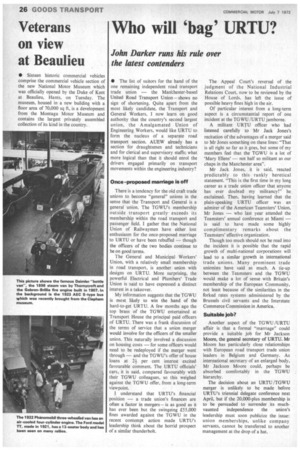Who will 'bag' URTU?
Page 28

If you've noticed an error in this article please click here to report it so we can fix it.
John Darker runs his rule over the latest contenders
• The list of suitors for the hand of the one remaining independent road transport trade union — the Marichester-based United Road Transport Union — shows no sign of shortening. Quite apart from the most likely candidate, the Transport and General Workers. I now learn on good authority that the country's second largest union, the Amalgamated Union of Engineering Workers, would like URTU to form the nucleus of a separate road transport section. AUEW already has a section for draughtsmen and technicians and for clerical and supervisory staffs; what more logical than that it should enrol the drivers engaged primarily on transport movements within the engineering industry?
Once–proposed marriage is off
There is a tendency for the old craft trade unions to become "general" unions in the sense that the Transport and General is a general union. The TGWU's membership outside transport greatlyexceeds its membership within the road transport and passenger field. I gather that the National Union of Railwaymen have either lost enthusiasm for the once-proposed marriage to URTU or have been rebuffed — though the officers of the two bodies continue to be on good terms.
The General and Municipal Workers' Union, with a relatively small membership in road transport, is another union with designs on URTU. More surprising, the powerful Electrical and Plumbers' Trade Union is said to have expressed a distinct interest in a takeover.
My information suggests that the TGWU is most likely to win the hand of the hard-to-get URTU. A few months ago the top brass of the TGWU entertained at Transport House the principal paid officers of URTU. There was a frank discussion of the terms of service that a union merger would involve for the officers of the smaller union. This naturally involved a discussion on housing costs — for some officers would need to be redeployed if the merger went through — and the TGWU's offer of house loans at 2-1 per cent interest excited favourable comment. The URTU officials' cars, it is said, compared favourably with their TGWU colleagues, so this weighed against the TGWU offer, from a long-term viewpoint.
I understand that URTU's financial position — a trade union's finances are often a factor in mergers-is as good as it has ever been but the swingeing £55,000 fines awarded against the TGWU in the recent contempt action made URTU's leadership think about the horrid prospect of a similar thunderbolt. The Appeal Court's reversal of the judgment of the National Industrial Relations Court, now to be reviewed by the House of Lords, has left the issue of possible heavy fines high in the air.
Of particular interest from a long-term aspect is a circumstantial report of one incident at the TGWU/URTU jamboree.
A militant URTU officer who had listened carefully to Mr Jack Jones's recitation of the advantages of a merger said to Mr Jones something on these lines: "That is all right so far as it goes, but some of my members feel that the TGWU is a lot of 'Mary Ellens' — not half so militant as our chaps in the Manchester area".
Mr Jack Jones, it is said, reacted predictably to this rankly heretical statement. "This is the first time in my long career as a trade union officer that anyone has ever doubted my militancy!" he exclaimed. Then, having learned that the plain-speaking URTU officer was an admirer of the American Teamsters' Union. Mr Jones — who last year attended the Teamsters' annual conference at Miami — is said to have made some highly complimentary remarks about the Teamsters' effective organization.
Though too much should not be read into the incident it is possible that the rapid growth of multi-national corporations will lead to a similar growth in international trade unions. Many prominent trade unionists have said as much. A tie-up between the Teamsters an.d the TGWU would make a lot of sense with Britain's membership of the European Community, not least because of the similarities in the forked rates systems administered by the Brussels civil servants and the Interstate Commerce Commission in America.
Suitable job?
Another aspect of the TGWU /URTU affair is that a formal "marriage" could provide a suitable job for Mr Jackson Moore, the general secretary of URTU. Mr Moore has particularly close relationships with European road transport trade union leaders in Belgium and Germany. As international secretary of an enlarged body, Mr Jackson Moore could, perhaps be absorbed comfortably in the TGWU hierarchy.
The decision about an URTU /TGWU merger is unlikely to be made before URTU's triennial delegate conference next April, but if the 20,000-plus membership is to be persuaded to surrender its muchvaunted independence the union's leadership must soon publicize the issue: union memberships, unlike company servants, cannot be transferred to another management at the drop of a hat.
















































































































































